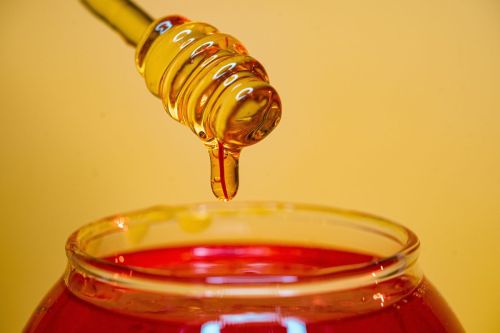
Did you know that babies under the age of 1 shouldn’t eat honey? Introducing your baby to new foods, flavors, and textures is an exciting milestone for parents but also one that comes with a bit of anxiety. Most parents are aware of the potential choking hazard of certain foods and will meticulously cut up fruits into tiny, bite-sized pieces, cook vegetables until they’re soft enough to eat, and slowly introduce foods that may trigger an allergic reaction.
The reason babies shouldn’t have honey until they reach their first birthday isn’t because of a choking hazard or allergic reaction, but because of the bacteria it contains that can cause serious illnesses in babies.
Why can’t babies have honey?
Clostridium botulinum is a form of bacteria found in honey. This bacteria can cause infant botulism, which according to Nemours, can lead to “muscle weakness, with signs like poor sucking, a weak cry, constipation, and decreased muscle tone (floppiness).” Although infant botulism is rare, it can be serious and most often occurs in babies under the age of 6 months, according to WebMD. This bacteria can affect an infant because their digestive system isn’t as able to defend against the bacteria as older children and adults.
What to avoid
Now that you know to avoid giving your baby honey until their first birthday, you may also want to avoid any foods that could contain honey as well. Honey is a commonly used natural sweetener in many products and baked goods, as well as certain crackers. It’s important to check the ingredient labels to avoid honey when giving your infant new foods.
What a difference a year makes
You may be wondering why honey is safe to consume after a baby celebrates their first birthday and not before. According to the Cleveland Clinic, “Ingesting botulinum spores doesn’t cause botulism in healthy older children and adults. But for reasons unknown, the toxin is released in infants younger than 12 months old. This is why experts advise that babies shouldn’t eat honey until they’re at least 1 year old.” Essentially, infants need to give their digestive system time to mature.
What to do if your baby accidentally eats honey
So what do you do if you accidentally give your baby a food product that contains honey? First of all, don’t panic! “Most honey doesn’t actually contain the spores, so the risk of developing botulism after one accidental ingestion is extremely low,” Andrea Hadley, MD, section chief and pediatric hospitalist at Helen DeVos Children’s Hospital in Grand Rapids, Michigan, explained to The Bump. Instead, she suggests keeping an eye on your baby for signs of botulism, which can include constipation, a weakened cry, loss of facial expression, a reduced gag reflex, slow feeding, and an overall weakness or floppiness. Contact your doctor if you have any concerns.
Introducing your baby to new foods can always be a bit of a nerve-wracking experience, which is why it’s important to follow the suggested guidelines and only introduce certain foods when your baby is ready. Honey is a great natural sweetener that your baby will probably love after they celebrate their first birthday.
Editors' Recommendations
- What is the Ferber Method, and is sleep training safe for my baby?
- Your questions answered – everything you need to know about baby-led weaning
- Are baby walkers safe? 5 dangerous reasons you shouldn’t add one to your registry
- Glass vs. plastic baby bottles: Here’s what doctors have to say
- Why do toddlers hit themselves? The reasons may surprise you